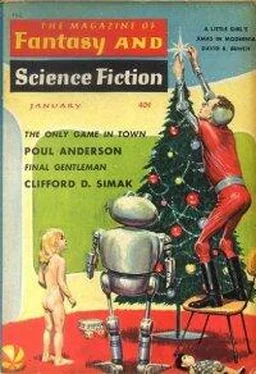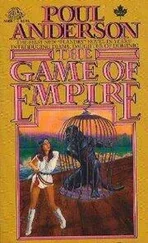Poul Anderson - The Only Game in Town
Здесь есть возможность читать онлайн «Poul Anderson - The Only Game in Town» весь текст электронной книги совершенно бесплатно (целиком полную версию без сокращений). В некоторых случаях можно слушать аудио, скачать через торрент в формате fb2 и присутствует краткое содержание. Год выпуска: 1960, Издательство: Mercury Press, Inc., Жанр: Альтернативная история, на английском языке. Описание произведения, (предисловие) а так же отзывы посетителей доступны на портале библиотеки ЛибКат.
- Название:The Only Game in Town
- Автор:
- Издательство:Mercury Press, Inc.
- Жанр:
- Год:1960
- ISBN:нет данных
- Рейтинг книги:3 / 5. Голосов: 1
-
Избранное:Добавить в избранное
- Отзывы:
-
Ваша оценка:
- 60
- 1
- 2
- 3
- 4
- 5
The Only Game in Town: краткое содержание, описание и аннотация
Предлагаем к чтению аннотацию, описание, краткое содержание или предисловие (зависит от того, что написал сам автор книги «The Only Game in Town»). Если вы не нашли необходимую информацию о книге — напишите в комментариях, мы постараемся отыскать её.
The Only Game in Town — читать онлайн бесплатно полную книгу (весь текст) целиком
Ниже представлен текст книги, разбитый по страницам. Система сохранения места последней прочитанной страницы, позволяет с удобством читать онлайн бесплатно книгу «The Only Game in Town», без необходимости каждый раз заново искать на чём Вы остановились. Поставьте закладку, и сможете в любой момент перейти на страницу, на которой закончили чтение.
Интервал:
Закладка:
Everard focused on the expedition. It wound through the open areas, more or less following a small river. Some seventy men rode shaggy, dun-colored, short-legged, long-headed Asian horses. They led pack animals and remounts. He identified a few native guides, as much by their awkward seat in the saddle as by their physiognomy and clothing. But the newcomers held his attention most.
“A lot of pregnant mares toting packs,” he remarked, half to himself. “I suppose they took as many horses in the ships as they could, letting them out to exercise and grazewherever they made a stop. Now they’re breeding more as they go along. That kind of pony is tough enough to survive such treatment.”
“The detachment at the ships is also raising horses,” Sandoval informed him. “I saw that much.”
“What else do you know about this bunch?”
“No more than I’ve told you, which is little more than you’ve now seen! And that record which lay for a while in Kublai’s archives. But you recall, it barely notes that four ships under the command of the Noyon Toktai and the scholar Li Tai-Tsung were dispatched to explore the islands beyond Japan.”
Everard nodded absently. No sense in sitting here and rehashing what they’d already gone over a hundred times. It was only a way of postponing action.
Sandoval cleared his throat. “I’m still dubious about both of us going down there,” he said. “Why don’t you stay in reserve, in case they get nasty?”
“Hero complex, huh?” said Everard. “No, we’re better off together. I don’t expect trouble anyhow. Not yet. Those boys are much too intelligent to antagonize anyone gratuitously. They’ve stayed on good terms with the Indians, haven’t they? And we’ll be a far more unknown quantity.… I wouldn’t mind a drink beforehand, though.”
“Yeh. And afterward, too!”
Each dipped in his saddlebag, took out a half-gallon canteen and hoisted it. The Scotch was pungent in Everard’s throat, heartening in his veins. He clucked to his horse and both Patrolmen rode down the slope.
A whistling cut the air. They had been seen. He maintained a steady pace toward the head of the Mongol line. A pair of outriders closed in on either flank, arrows nocked to their short powerful bows, but did not interfere.
I suppose we look harmless, Everard thought. Like Sandoval, he wore twentieth-century outdoor clothes: hunting jacket to break the wind, hat to keep off the rain. His own outfit was a good deal less elegant than the Navajo’s Abercrombie Fitch special. They both bore daggers for show, Mauser machine pistols and thirtieth-century stun-beam projectors for business.
The troop reined in, so disciplined that it was almost like one man halting. Everard scanned them closely as he neared. He had gotten a pretty complete electronic education in an hour or so before departure—language, history, technology, manners, morals—of Mongols and Chinese and even the local Indians. But he had never before seen these people close up.
They weren’t spectacular: stocky, bowlegged, with thin beards and flat, broad faces that shone greased in the sunlight. They were all well equipped, wearing boots and trousers, laminated leather cuirasses with lacquer ornamentation, conical steel helmets that might have a spike or plume on top. Their weapons were curved sword, knife, lance, compound bow. One man near the head of the line bore a standard of gold-braided yak tails. They watched the Patrolmen approach, their narrow dark eyes impassive.
The chief was readily identified. He rode in the van, and a tattered silken cloak blew from his shoulders. He was rather larger and even more hard-faced than his average trooper, with a reddish beard and almost Roman nose. The Indian guide beside him gaped and huddled back; but Toktai Noyon held his place, measuring Everard with a steady carnivore look.
“Greeting,” he called, when the newcomers were in earshot. “What spirit brings you?” He spoke the Lutuami dialect, which was later to become the Klamath language, with an atrocious accent.
Everard replied in flawless, barking Mongolian: “Greeting-to you, Toktai son of Batu. The Tengri willing, we come in peace.”
It was an effective touch. Everard glimpsed Mongols reaching for lucky charms or making signs against the evil eye. But the man mounted at Toktai’s left was quick to recover a schooled self-possession. “Ah,” he said, “so men of the Western lands have also reached this country. We did not know that.”
Everard looked at him. He was taller than any Mongol, his skin almost white, his features and hands delicate. Though dressed much like the others, he was unarmed. He seemed older than the Noyon, perhaps fifty. Everard bowed in the saddle and switched to North Chinese: “Honored Li Tai-Tsung, it grieves this insignificant person to contradict your eminence, but we belong to the great realm further south.”
“We have heard rumors,” said the scholar. He couldn’t quite suppress excitement. “Even this far north, tales have been borne of a rich and splendid country. We are seeking it that we may bring your Khan the greeting of the Kha Khan, Kublai son of Tuli, son of Genghis; the earth lies at his feet.”
“We know of the Kha Khan,” said Everard, “as we know of the Caliph, the Pope, the Emperor, and all lesser monarchs.” He had to pick his way with care, not openly insulting Cathay’s ruler but still subtly putting him in his place. “Little is known in return of us, for our master does not seek the outside world, nor encourage it to seek him. Permit me to introduce my unworthy self. I am called Everard and am not, as my appearance would suggest, a Russian or Westerner. I belong to the border guardians.”
Let them figure out what that meant.
“You didn’t come with much company,” snapped Toktai.
“More was not required,” said Everard in his smoothest voice.
“And you are far from home,” put in Li.
“No farther than you would be, honorable sirs, in the Kirghiz marches.”
Toktai clapped a hand to his sword hilt. His eyes were chill and wary. “Come,” he said. “Be welcome as ambassadors, then. Let’s make camp and hear the word of your king.”
3
The sun, low above the western peaks, turned their snowcaps tarnished silver. Shadows lengthened down in the valley, the forest darkened, but the open meadow seemed to glow all the brighter. The underlying quiet made almost a sounding board for such noises as existed: rapid swirl and cluck of the river, ring of an ax, horses cropping in long grass. Woodsmoke tinged the air.
The Mongols were obviously taken aback at their visitors and this early halt. They kept wooden faces, but their eyes would stray to Everard and Sandoval and they would mutter formulas of their various religions—chiefly pagan, but some Buddhist, Moslem, or Nestorian prayers. It did not impair the efficiency with which they set up camp, posted guard, cared for the animals, prepared to cook supper. But Everard judged they were more quiet than usual. The patterns impressed on his brain by the educator called Mongols talkative and cheerful as a rule.
He sat cross-legged on a tent floor. Sandoval, Toktai, and Li completed the circle. Rugs lay under them, and a brazier kept a pot of tea hot. It was the only tent pitched, probably the only one available, taken along for use on ceremonial occasions like this. Toktai poured kumiss with his own hands and offered it to Everard, who slurped as loudly as etiquette demanded and passed it on. He had drunk worse things than fermented mare’s milk, but was glad that everyone switched to tea after the ritual.
The Mongol chief spoke. He couldn’t keep his tone smooth, as his Chinese amanuensis did. There was an instinctive bristling: what foreigner dares approach the Kha Khan’s man, save on his belly? But the words remained courteous: “Now let our guests declare the business of their king. First, would you name him for us?”
Читать дальшеИнтервал:
Закладка:
Похожие книги на «The Only Game in Town»
Представляем Вашему вниманию похожие книги на «The Only Game in Town» списком для выбора. Мы отобрали схожую по названию и смыслу литературу в надежде предоставить читателям больше вариантов отыскать новые, интересные, ещё непрочитанные произведения.
Обсуждение, отзывы о книге «The Only Game in Town» и просто собственные мнения читателей. Оставьте ваши комментарии, напишите, что Вы думаете о произведении, его смысле или главных героях. Укажите что конкретно понравилось, а что нет, и почему Вы так считаете.











